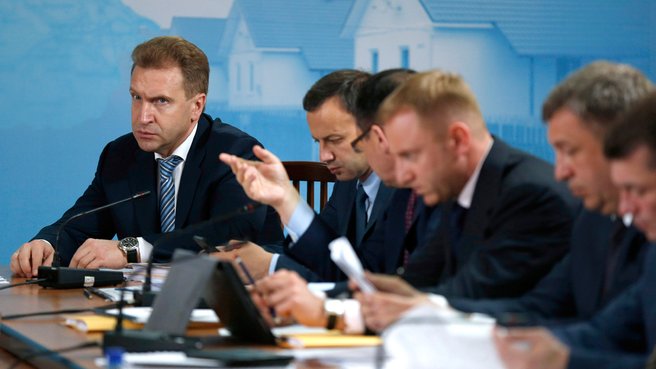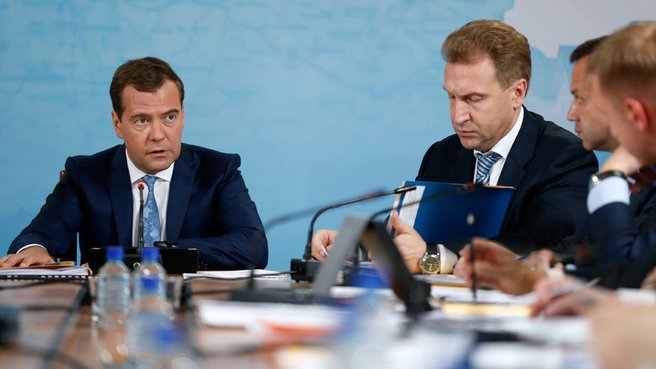Transcript:
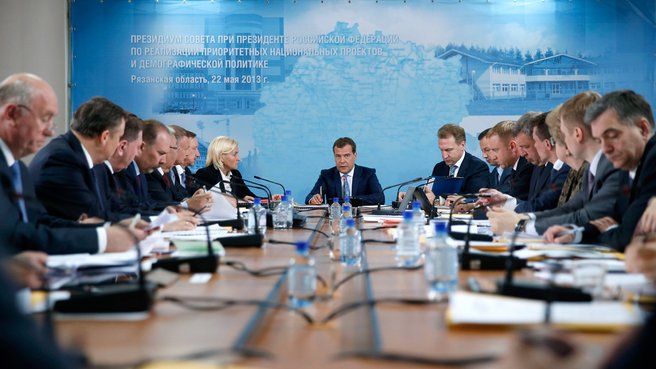
Meeting of the Presidium of the Presidential Council for the Implementation of Priority National Projects and Demographic Policy
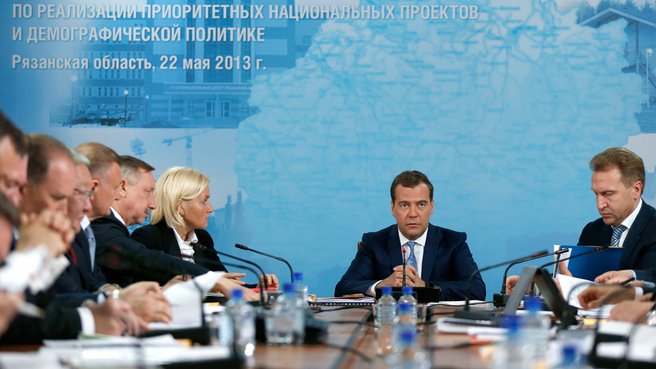
Meeting of the Presidium of the Presidential Council for the Implementation of Priority National Projects and Demographic Policy
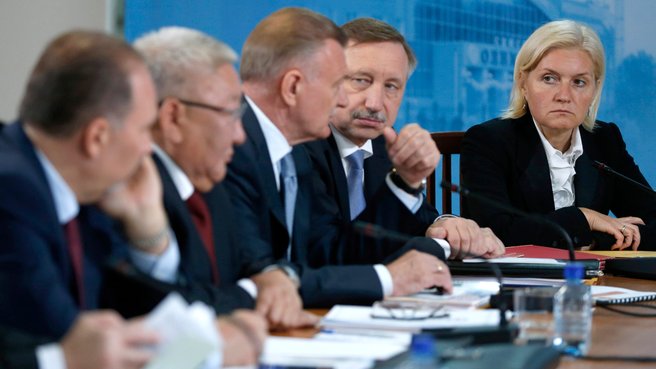
Meeting of the Presidium of the Presidential Council for the Implementation of Priority National Projects and Demographic Policy
Meeting of the Presidium of the Presidential Council for the Implementation of Priority National Projects and Demographic Policy
Dmitry Medvedev: Good afternoon, colleagues. Today we are holding a meeting of the Presidium of the Council for the Implementation of Priority National Projects and Demographic Policy. We have met in the Ryazan Region to discuss a very important issue, which we have been tackling on a regular basis but this has not decreased its significance. I am referring to the social development of rural areas and immediate tasks for 2013-2015. I’d like to remind you that we have been working on this issue within the framework of the national project for agribusiness development since 2006. The programme itself was approved in 2003. However, it has remained on the front burner to this day.
I have been shown around a number of facilities here. I know that you're usually only invited to successful farms, yet I must say that the development standards, including social standards, I have seen there are highly commendable.
As I have said, the programme was launched in 2003. It was augmented with the target of providing housing to young rural professionals in 2006 and with a programme for connecting new clients to the gas supply network in 2008. The gas supply programme had been launched some time before that, and the two were moving in parallel. All measures stipulated under these programmes are being implemented within the framework of the national programme for Agricultural Development and Regulation of Agricultural Products, Commodities and Food.
A large proportion of Russians live in rural areas, 26% or 37 million according to recent data. When I started working on this project in 2006, the figure was different: at that time, around 34% of the population lived in rural areas. This should be noted. I don’t want to say that this is a negative development, but it is a fact that people from rural areas are moving to cities and towns.
Dmitry Medvedev: The launch of the national agriculture development project allowed us to focus on the key issues and to create a foundation for resolving them. This includes building housing for people in rural areas, connecting them to the gas supply network, building social and engineering infrastructure and attracting young professionals. From 2008 to 2012 we allocated around 200 billion roubles for the national project, 25% of which came from the federal budget.
When we launched this project we had to work with what we inherited from the previous decades: lack of quality housing and roads, huge problems with healthcare services, low educational standards, lack of cultural facilities and an absolutely terrible situation with sports. These problems were aggravated by the shortage of skilled personnel in all of these spheres, which ultimately hindered the development of the main rural business, agriculture, because you cannot achieve anything without professionals.
The launch of the national agriculture development project allowed us to focus on the key issues and to create a foundation for resolving them. This includes building housing for people in rural areas, connecting them to the gas supply network, building social and engineering infrastructure and attracting young professionals. From 2008 to 2012 we allocated around 200 billion roubles for the national project, 25% of which came from the federal budget.
Housing conditions have been improved for 97,000 families, half of them young professionals.
Many rural houses have been connected to the gas supply system. When we launched this project, the situation was dramatic. The number of houses connected to the gas supply system in cities was many times larger than in rural areas, which is unacceptable. I don’t want to say that we must build pipelines to each remote village, but we have definitely improved the situation over the past few years. This has been a collective task for Gazprom and regional administrations, which share the responsibility for connecting people to the gas supply network.
New schools for approximately 30,000 pupils have been opened, as well as new culture centres, over 300 community healthcare centres and sports facilities.
These are good results, but they differ from region to region. Truth be told, much depends on the regional authorities’ focus on social development and whether they address these issues as a priority. There are differences in their approaches, which we much address.
We have accumulated positive experience thanks to this project, which must be promoted in the regions with greater problems. There are regional leaders present here who will speak about this in more detail.
As I have said, we have analysed the implementation of social programmes. I believe that colleagues will speak about their achievements and problems.
Dmitry Medvedev: In the upcoming thee-year period, we plan to allocate around 90 billion roubles for agriculture, a third of which will come from the federal budget.
We continue working to implement the federal targeted programme entitled Social Development of Rural Areas. In 2014 we will launch a new federal targeted programme, Sustainable Development of Rural Areas, which will run until 2017 and in the planning period until 2020. We approved this programme’s concept last year. The draft was prepared by the Ministry of Agriculture and retains the main points of the ongoing programme and also includes new events. We should adopt this programme; I hope the minister will speak about this.
In the upcoming thee-year period, we plan to allocate around 90 billion roubles for agriculture, a third of which will come from the federal budget.
I’d like to draw your attention to several issues and pending tasks.
The first and one of the most acute issues is housing. Much will depend on its resolution in rural areas, including the attraction of professionals. In the next three years we plan to build 2.2 million square metres of housing in rural areas, including 1.2 million for young families and young professionals.
People want to live comfortably. We have visited houses that have been built here. I must tell you that they are very good houses even by modern standards, and compared with 20 years ago they are absolutely top class. We must implement comprehensive housing projects, which should include village amenities and the construction of modern infrastructure such as schools, hospitals, community healthcare centres, preschools, shops and roads.
Dmitry Medvedev: In the next three years we plan to build 2.2 million square metres of housing in rural areas, including 1.2 million for young families and young professionals.
We have implemented a considerable number of infill construction projects over the past five years, but mostly as part of the projects to develop existing agribusinesses and mostly in the Central Federal District, although such projects have also been implemented in other regions.
We need to propose new solutions for the housing issue. The draft of the federal targeted programme which I mentioned provides for issuing grants to local village improvement initiatives. We should also consider other housing solutions, including the so-called flexible mortgage for some groups of rural residents or for some regions.
The second important issue concerns raising salaries for doctors, teachers and cultural personnel. This factor has a direct effect on the quality of social services and is important for levelling off the personnel imbalance between cities and rural areas. We are tacking this issue in line with the programme for the gradual improvement of the remuneration system in these establishments designed for 2012-2018.
Moreover, one-time compensations have been approved at 1 million roubles per doctor in 2012 to support healthcare professionals who relocate to rural areas. Overall, this is a good idea. We have allocated a total of some 8 billion roubles to encourage 8,000 doctors to settle in rural areas. In 2013 we plan to allocate 2 billion roubles to attract more healthcare professionals. Rural healthcare establishments have quite a few doctors, nearly 90% of their requirements, and also 95% of the necessary nursing and other mid-level healthcare personnel – [Deputy Prime Minister] Olga Golodets and I discussed this issue during the flight here.
Dmitry Medvedev: We have allocated a total of some 8 billion roubles to encourage 8,000 doctors to settle in rural areas. In 2013 we plan to allocate 2 billion roubles to attract more healthcare professionals.
But the situation differs from region to region; some of them have enough healthcare personnel while the situation in others is not so good. We must consider ways to encourage healthcare professionals to settle in the regions which need them most of all.
Roads, our third issue, are being built under a special programme, part of the Transport System Development Federal Targeted Programme. We started implementing this programme fairly recently, and although the work is not easy, roads have been built to provide 442 rural communities with permanent year-round links with district centres. There are 70 such rural communities in the Central Federal District, but we must continue this work because, to be honest, there is no end in sight. In 2013, about 7.5 billion roubles will be allocated from the federal budget. This amount is not very impressive. There are plans to build paved roads towards 250 rural communities.
Schools are our fourth issue. Currently, rural schools account for 60% of Russian schools, and nearly half of them have a small number of students. Of course, we will keep most of them, and they will not be there just to make up the numbers but will provide top-quality modern education and give their students a good start in life. The national project Education was conceived precisely for this purpose, and we have been working together to modernise regional secondary education systems. Today, 15,000 schools have enough vehicles to bring their students to school. We also started implementing this part of the programme successfully since 2006, and we must continue to focus on it. Another high priority objective is providing Internet access at schools and installing computers.
In conclusion, I would like to say a few words about rural clubs and sport facilities. I mention it last but not because this issue is unimportant. Considering the fact that many villages are located in remote areas, the creation of mobile libraries and culture centres, including centres with electronic resources, remains a highly important objective. Since 2013, we have been paying cash bonuses to the best rural cultural institutions and their specialists (100,000 and 50,000 roubles, respectively). We must think about other federal and regional support measures.
Dmitry Medvedev: There are 70 such rural communities in the Central Federal District, but we must continue this work because, to be honest, there is no end in sight. In 2013, about 7.5 billion roubles will be allocated from the federal budget. This amount is not very impressive. There are plans to build paved roads towards 250 rural communities.
Let’s discuss how these issues can be addressed.
I would also like to draw your attention to the fact that we have drafted a plan of Presidium meetings for 2013, which includes such issues as healthcare, education and housing construction. I would like to draw the attention of Presidium members and all guests that you can submit your proposals, so that we can start working under this plan in 2013. I believe that this will be useful. And now let’s hear the Minister’s report. After that, I suggest that we exchange opinions. I will give all governors who want to speak an opportunity to do so. Naturally, our colleagues, senior federal officials, can do the same. Nikolai Fyodorov, the Minister of Agriculture, has the floor.
<…>
